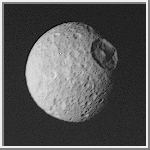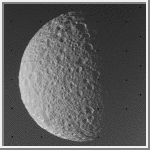















|
Mimas [MY-mass] is one of the innermost moons of Saturn. Mimas was a Titan who was slain by Hercules. William Herschel discovered the moon in 1789. The surface is icy and heavily cratered. Mimas has a low density, meaning it probably consists mostly of ice. Because Mimas has such a low temperature of about -200° C (-328°F), the impact features may date back to the time of the moon's creation.
One of the craters, named Herschel, is surprisingly large in comparison to the size of the moon. The crater is 130 kilometers (80 miles) wide, one-third the diameter of Mimas. Herschel is 10 kilometers (6 miles) deep, with a central mountain almost as high as Mount Everest on Earth. This central peak rises 6 kilometers (4 miles) above the crater floor. This impact probably came close to disintegrating the moon. Traces of fracture marks can be seen on the opposite side of Mimas.
Although Mimas is heavily cratered, the cratering is not uniform. Most of the surface is covered with craters greater than 40 kilometers (25 miles) in diameter but in the south polar region, craters greater than 20 kilometers (12 miles) are generally lacking. This suggests that some process removed the larger craters from these areas.
| Views of Mimas |
|---|
 Mimas & Herschel Crater
Mimas & Herschel Crater
This image of Mimas was acquired by the Voyager 1 spacecraft on
November 11, 1980.
The large crater on the right limb is named Herschel. It
is 130 kilometers (80 miles) wide and one-third the
diameter of Mimas. Herschel is 10 kilometers (6 miles) deep,
with a central mountain almost as high as Mount Everest on Earth.
This impact probably came close to disintegrating the moon.
(Credit: Calvin J. Hamilton)
 Mimas
Mimas
This image of Mimas was acquired by the Voyager 1 spacecraft on
November 13, 1980. Traces of fracture marks, probably due to the
Herschel Impact, can be seen on this side of Mimas.
(Credit: Calvin J. Hamilton)
Copyright © 1997 by Calvin J. Hamilton. All rights reserved.